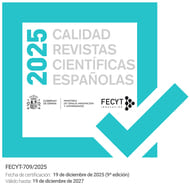El motivo del aprender en Sófocles
Resumen
Aprender se concibe como algo deseable en Sófocles, aunque también difícil de alcanzar. El modo en que algunos de sus personajes consiguen aprender, siempre demasiado tarde, pone de relieve la necesidad por parte del hombre de adoptar una postura crítica ante lo que percibe, pero aceptando al mismo tiempo sus límites humanos, así como la superioridad divina.
Citas
ALAMILLO, A. (1981): Sófocles. Tragedias, Madrid (repr. 1992).
BAÑULS-OLLER, J. V. (2000): “Dualidad dramática y conflicto trágico”, en K. ANDRESEN, J. V. BAÑULS, F. DE MARTINO (eds.), La Dualitat en el Teatre, Bari, pp. 31-44.
BARRETT, J. (2002): Staged Narrative. Poetics and the Messenger in Greek Tragedy, Berkeley - Los Angeles - London.
BURIAN, P. (1997): “Myth into Muthos: the Shaping of Tragic Plot”, en P. E. EASTERLING (ed.), The Cambridge Companion to Greek Tragedy, Cambridge, pp. 178-208.
CORAY, M. (1993): Wissen und Erkennen bei Sophokles, Berlin.
CRESPO ALCALÁ, P. (2000): “La dualidad del Edipo de Sófocles a través de tuflo"v / derv komai”, en K. ANDRESEN, J. V. BAÑULS, F. DE MARTINO (eds.), La Dualitat en el Teatre, Bari, pp. 97-113.
CROPP, M. (1997): “Antigone’s Final Speech (Sophocles, Antigone 891-928)”, G&R 44: 137-60.
DILLER,H.(1971): “Göttliches undmenschlichesWissen bei Sophokles”,en H.-J.NEWIGER,H. SEYFFERT (eds.), Kleine Schriften zur antiken Literatur, München, pp. 255-71.
EASTERLING, P. E. (1982): Sophocles. Trachiniae, Cambridge.
ERP TAALMAN KIP, A. M. VAN (1976): “Some Reflections on the Chorus in Sophocles’ Oedipus Tyrannus”, en J. M. BREMER, S. L. RADT, C. J. RUIGH (eds.), Miscellanea Tragica in Honorem J. C. Kamerbeek, Amsterdam, pp. 71-83.
GELLIE, G. H. (1972): Sophocles. A Reading, Melbourne.
GRIFFITH, M. (1999): Sophocles. Antigone, Cambridge.
HALLERAN, M. R. (1986): “Lichas’ Lies and Sophoclean Innovation”, GRBS 27: 239-47.
JEBB, R. (19713): Sophocles. The Plays and Fragments. Part III. The Antigone, Amsterdam.
JOHANSEN, H. F. (1959): General Reflection in tragic Rhesis. A Study of Form, Copenhagen.
KNOX, B. M. W. (1998): Oedipus at Thebes. Sophocles’ Tragic Hero and His Time, New Haven - London (19571).
LLOYD-JONES, H. - WILSON, N. G. (1990): Sophoclis fabulae, Oxford.
MACLEOD, L. (2001): Dolos and Dike in Sophokles’ Elektra, Leiden.
NUSSBAUM, M. C. (1995): La fragilidad del bien. Fortuna y ética en la tragedia y la filosofía griega, Madrid (trad. de The Fragility of Goodness. Luck and Ethics in Greek Tragedy and Philosophy, Cambridge, 1986).
ORMAND, K. (1999): Exchange and the Maiden. Marriage in Sophoclean Tragedy, Austin.
PINO CAMPOS, L. M. (2003): “Saber y conocer en las tragedias de Sófocles: Introducción a un estudio léxico”, Fortunatae 14: 149-86.
PINO CAMPOS, L. M. (2004): “Saber y conocer en las tragedias de Sófocles: Introducción a un estudio léxico. II”, Fortunatae 15: 143-55.
QUIJADA, M. (2003): “El prólogo trágico y la cuestión de la orthoepeia en Ranas de Aristófanes”, Veleia 20: 375-82.
REINHARDT, K. (1991): Sófocles, Barcelona (trad. de Sophokles, Frankfurt, 1976).
RENEHAN, R. (1976): Studies in Greek Texts. Critical Observations to Homer, Plato, Euripides, Aristophanes and other Authors, Göttingen.
ROCCO, C. (1997) : “Sophocles’ OedipusTyrannos.TheTragedy of Enlightenment”, Tragedy and Enlightenment. Athenian Political Thought and the Dilemmas of Modernity, Berkeley - Los Angeles - London, pp. 34-67.
SCABUZZO, S. (2001): “La prueba judicial en la tragedia: el caso de Edipo Rey”, Argos 25: 79-93.
SCHWARTZ, J. D. (1986): “Human Action and Political Action in Oedipus Tyrannos”, en J. P. EUBEN (ed.), Greek Tragedy and Political Theory, Berkeley - Los Angeles - London, pp. 183-209.
SEGAL, C. (1981): Tragedy and Civilization. An Interpretation of Sophocles, Cambridge.
SEGAL, C. (2001): Oedipus Tyrannus. Tragic Heroism and the Limits of Knowledge, New York-Oxford (19931).
SHAPIRO, S. O. (1994): “Learning through Sufferings: Human Wisdom in Herodotus”, CJ 89: 349-55.
SHELTON, J.-A. (1984): “Human Knowledge and Self-Deception: Creon as the Central Character of Sophocles’ Antigone”, Ramus 13: 102-23.
VÍLCHEZ, M. (1976): El engaño en el teatro griego, Barcelona.
WHITMAN, C. H. (1951): Sophocles. A Study of Heroic Humanism, Cambridge.
Los autores conservan los derechos de autor y garantizan a la revista el derecho de ser la primera publicación del trabajo al igual que licenciarlo bajo una Creative Commons Attribution License que permite a otros compartir el trabajo con un reconocimiento de la autoría del trabajo y la publicación inicial en esta revista.
Los autores pueden establecer por separado acuerdos adicionales para la distribución no exclusiva de la versión de la obra publicada en la revista (por ejemplo, situarlo en un repositorio institucional o publicarlo en un libro), con un reconocimiento de su publicación inicial en esta revista.






